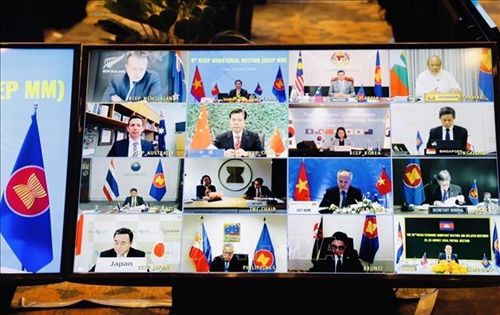November 15, 2020 | 17:39 (GMT+7)
Australian minister highlights significance of RCEP amid global trade uncertainty
Australian Minister for Trade, Tourism and Investment Simon Birmingham has recently emphasized the importance of the Regional Comprehensive Economic Partnership (RCEP) agreement, which is expected to be signed on November 15 between 10 ASEAN countries and China, Japan, the Republic of Korea (RoK), New Zealand and Australia.
“It's a hugely symbolically significant agreement, coming at a time of global trade uncertainty,” he told local media. “It says in a really powerful and tangible way that our region, which has been the driver of global economic growth, is still committed to the principles of trade, openness and ambition.”
    |
 |
|
At the eighth RCEP Ministerial Meeting |
Birmingham said the RCEP is the world's largest free-trade deal, representing 30 percent of global GDP and 30 percent of the world's population. It is the first time major trading partners like China, the RoK, Japan and Australia have joined together in one agreement, reducing the reliance on a patchwork of bilateral deals.
He added that Australian businesses in the services sector will benefit most from the deal, which will recognise qualifications and licensing practices, while allowing them to operate remotely and set up offices throughout the RCEP region.
The sector includes education, healthcare, accountants, engineering and legal service providers, and employs four out of five Australians while accounting for up to 70 percent of Australia's GDP.
“It will make it much easier for what is a huge part of Australia's economy, to trade overseas,” Birmingham said. “Given the rise of the middle-income groups across many RCEP countries, there is a rising demand for more of those safe, high-quality health, education and other services that Australia is well placed to deliver.”
The deal will also strengthen supply chains with common rules of origin and establish new e-commerce rules across the region, he added.
Source: VNA